 Petzlover
Petzlover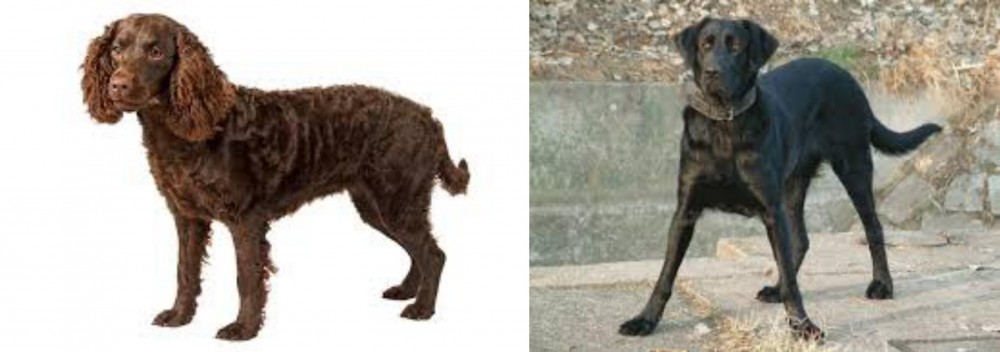 American Water Spaniel is originated from United States but Cao de Castro Laboreiro is originated from Portugal. American Water Spaniel may grow 14 cm / 5 inches shorter than Cao de Castro Laboreiro. American Water Spaniel may weigh 50 kg / 110 pounds lesser than Cao de Castro Laboreiro. Both American Water Spaniel and Cao de Castro Laboreiro has almost same life span. American Water Spaniel may have less litter size than Cao de Castro Laboreiro. American Water Spaniel requires Moderate Maintenance. But Cao de Castro Laboreiro requires Low Maintenance
American Water Spaniel is originated from United States but Cao de Castro Laboreiro is originated from Portugal. American Water Spaniel may grow 14 cm / 5 inches shorter than Cao de Castro Laboreiro. American Water Spaniel may weigh 50 kg / 110 pounds lesser than Cao de Castro Laboreiro. Both American Water Spaniel and Cao de Castro Laboreiro has almost same life span. American Water Spaniel may have less litter size than Cao de Castro Laboreiro. American Water Spaniel requires Moderate Maintenance. But Cao de Castro Laboreiro requires Low Maintenance
 The American Water Spaniel was developed in the United States. He is the state dog of Wisconsin and was developed there in the 19th century. The bloodlines of this spaniel are varied but certainly include the English Water Spaniel and the Irish Water Spaniel. Even though they are the state dog of Wisconsin they were almost extinct when Dr. Fred J. Pfeifer rescued the breed. The numbers had fallen after World War II because hunting was now a recreational sport and not needed to provide food for the family. He then started a breed club and wrote a breed standard, both of which were recognized by the United Kennel Club and the American Kennel Club.
When first developed the American Water Spaniel was known as the American Brown Spaniel. It was bred with a curly, thick coat so that it cold be sustained in Wisconsin winters and cold water. It was bred to hunt grouse, water fowl and prairie chickens as well as furry land animals. Pfeifer advertised his dogs for sale everywhere using a mailer that read: “, "The American Brown Spaniel is distinctively an American production. Hunters have known this type for years and it was through their efforts that this dog was propagated.... For years we have bred only selective stock, breeding for gameness, stability, courage, intelligence, and beauty. They are dogs to admire and trust under all conditions whether in the home circle or in the field with the outdoor man."[2]
The American Water Spaniel was developed in the United States. He is the state dog of Wisconsin and was developed there in the 19th century. The bloodlines of this spaniel are varied but certainly include the English Water Spaniel and the Irish Water Spaniel. Even though they are the state dog of Wisconsin they were almost extinct when Dr. Fred J. Pfeifer rescued the breed. The numbers had fallen after World War II because hunting was now a recreational sport and not needed to provide food for the family. He then started a breed club and wrote a breed standard, both of which were recognized by the United Kennel Club and the American Kennel Club.
When first developed the American Water Spaniel was known as the American Brown Spaniel. It was bred with a curly, thick coat so that it cold be sustained in Wisconsin winters and cold water. It was bred to hunt grouse, water fowl and prairie chickens as well as furry land animals. Pfeifer advertised his dogs for sale everywhere using a mailer that read: “, "The American Brown Spaniel is distinctively an American production. Hunters have known this type for years and it was through their efforts that this dog was propagated.... For years we have bred only selective stock, breeding for gameness, stability, courage, intelligence, and beauty. They are dogs to admire and trust under all conditions whether in the home circle or in the field with the outdoor man."[2]
In Wisconsin, around the wolf River and the Fox River, hunters were looking for a water dog that could also hunt on land. They needed a dog that could work a variety of fowl and game but who was small enough for a skiff and strong enough for the artic water temperatures of Wisconsin in the Winter. So, in addition to the spaniels named above, other breeds such as the Curly Coated Retriever, the Poodle, Native Indian dogs and the Sussex Spaniel were intermixed. When first developed the American Water Spaniel was known as the American Brown Spaniel. It was bred with a curly, thick coat so that it cold be sustained in Wisconsin winters and cold water. It was bred to hunt grouse, water fowl and prairie chickens as well as furry land animals. The American Water Spaniel was then itself used to develop another new breed, the Boykin Spaniel. In 1985 Wisconsin declared the American Water Spaniel to be the official state dog. Even so there remain only a few thousand dogs in existence. Though recognized by the AKC, they are neither spaniels nor retrievers and remain unclassified. Because of this they cannot compete in AKC field trials, but they do compete in AKC hunt tests. Though rare, the American Water Spaniel is a great hunting dog, retriever and companion.
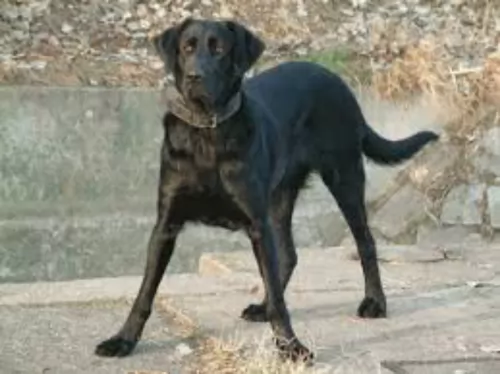 Cão de Castro Laboreiro originates from Portugal. Also known as the Portuguese Cattle Dog he was used long ago to guard livestock. Today, the modern Cao de Castro Laboreiro is descended from the molosser type dog.
Cão de Castro Laboreiro originates from Portugal. Also known as the Portuguese Cattle Dog he was used long ago to guard livestock. Today, the modern Cao de Castro Laboreiro is descended from the molosser type dog.
There are hints to the dog's origins from the 19th century, but changes in agricultural methods meant a disappearance of the dog as a livestock protector. Today the dog is mostly kept as a pet and was first seen at a dog show in 1914.
The Cão de Castro Laboreiro is recognized by the Fédération Cynologique Internationale as well as being recognized by the United Kennel Club in the United States.It is a rare dog and not many exist today but in Portugal, the USA and United Kingdom you will find a few breeders.
 The American Water spaniel is a midsized, muscular dog. There is nothing flashy about his looks or his work performance. He is however a consistent, competent swimmer and hunter. His brown coat is wavy or tightly curled, waterproof and dense. His feet have thick pads and webbed toes. The AWS is intelligent, happy, and easy going. He is a very versatile hunting dog on land and in water. The breed has not changed much since it originated in the 19th century. They can be liver, chocolate or brown. The eyes should be the same as the color of the coat. They have broad skulls with wide, long ears and an undocked tail.
The American Water spaniel is a midsized, muscular dog. There is nothing flashy about his looks or his work performance. He is however a consistent, competent swimmer and hunter. His brown coat is wavy or tightly curled, waterproof and dense. His feet have thick pads and webbed toes. The AWS is intelligent, happy, and easy going. He is a very versatile hunting dog on land and in water. The breed has not changed much since it originated in the 19th century. They can be liver, chocolate or brown. The eyes should be the same as the color of the coat. They have broad skulls with wide, long ears and an undocked tail.
They have a square, medium sized muzzle and wide nose. They have a bite that is level or scissors. The legs of the muscular American Water Spaniel are medium in length and the tail is full, with a medium length, curved and feathered. The dewclaws might or might not be removed.
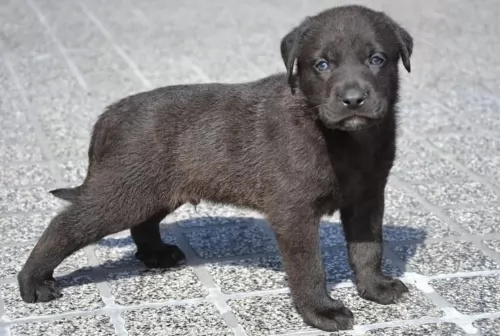 The Cão de Castro Laboreiro is a large dog, with height being in the region of 55 to 60cm and weight being in the region of 45 - 70kg. People describe the dog as wolf-like with a coat that is fairly short, thick and course. The coat is brindle with a base color of shades of grey, chestnut and black.
The Cão de Castro Laboreiro is a large dog, with height being in the region of 55 to 60cm and weight being in the region of 45 - 70kg. People describe the dog as wolf-like with a coat that is fairly short, thick and course. The coat is brindle with a base color of shades of grey, chestnut and black.
This large mastiff-type dog always has a black nose, his tail is long and carried high, but never curling over the back. He has a broad head and is much like the Labrador in looks, being free of wrinkles on the face.The ears of the Cao de Castro Laboreiro are medium-in-size and floppy while the eyes are dark brown.
The Cao de Castro Laboreiro makes an excellent pet as he forms strong bonds with his human family. He is territorial and makes an exceptional guard dog. He doesn’t particularly like strangers and is aloof around them.
This is an intelligent dog breed, he is strong-willed and stubborn, but when he is around the children in the family he is gentle and loving. When he has been trained and socialized, which is always highly recommended with every dog, he gets along with other pets in the home too.
 Bred to work the American Water Spaniels are loyal to their people, want to please them, but are not so great with strangers. They are stubborn and love to be the center of attention. They are often one person or one family dogs. They need an owner who is the pack leader and willing to put in the time to train them. However, they are a versatile breed and need variety in training and activities rather than repetitive activities. They are prone to resource guarding, slow maturation and dominance. These negative traits are dissipated with a strong leader, good training and a lot of daily activity. They are sensitive as well as stubborn. Do not use a punishment-oriented training with them. They will respond out of love and loyalty or not at all. This is a breed that wants to be the alpha over the people and will do so if you let him. Keep them fenced as being hunters they love to wander and will leave home whenever they can.
Bred to work the American Water Spaniels are loyal to their people, want to please them, but are not so great with strangers. They are stubborn and love to be the center of attention. They are often one person or one family dogs. They need an owner who is the pack leader and willing to put in the time to train them. However, they are a versatile breed and need variety in training and activities rather than repetitive activities. They are prone to resource guarding, slow maturation and dominance. These negative traits are dissipated with a strong leader, good training and a lot of daily activity. They are sensitive as well as stubborn. Do not use a punishment-oriented training with them. They will respond out of love and loyalty or not at all. This is a breed that wants to be the alpha over the people and will do so if you let him. Keep them fenced as being hunters they love to wander and will leave home whenever they can.
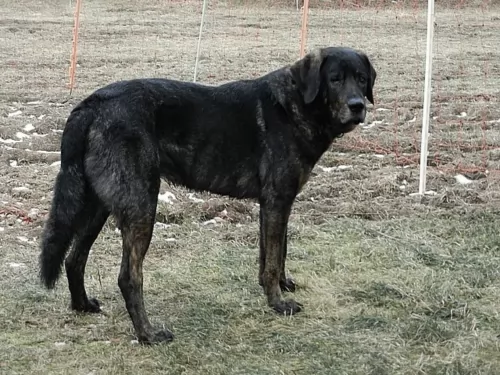 Environment and upbringing have plenty to do with how a dog turns out. People who just buy a dog for guardian purposes and nothing else can’t expect companionship in return.
Environment and upbringing have plenty to do with how a dog turns out. People who just buy a dog for guardian purposes and nothing else can’t expect companionship in return.
The Cão de Castro Laboreiro has always been a fearless guardian of livestock with his strong protective characteristics. He is intelligent and recognizes that a child in the family needs his protection.
This is a large dog who is strong, brave and intelligent but with his human family he is gentle, loving and loyal. Nonetheless he still requires a firm owner, and if you’re fair and firm with him you get the best with him. With this dog you can form a close friendship and bond.
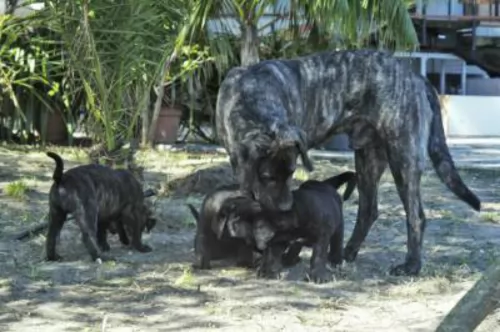 The Cão de Castro Laboreiro is generally a healthy breed, but even so, it is good to be aware of typical canine diseases that your pet may develop.
The Cão de Castro Laboreiro is generally a healthy breed, but even so, it is good to be aware of typical canine diseases that your pet may develop.
There are many eye problems that dogs have to contend with and if you see any kind of ulceration in your dogs eye, get veterinary advice.
A dog should always have access to a shady spot. Never ever leave your dog in a hot car. Heat builds up quickly and death can result soon as the body temperature rises.
Roundworm and tapeworm can infest dogs and you’ll need to speak to your vet about a worming program. Lice, mites and ticks are all parasites which attach themselves to the skin.
 Feeding the American Water Spaniel is no mystery. They need a high quality dry dog food with an eye toward calorie consumption. Some AWS have a tendency to become obese. Treats are important to the AWS in training but can add to the obesity concerns.
Feeding the American Water Spaniel is no mystery. They need a high quality dry dog food with an eye toward calorie consumption. Some AWS have a tendency to become obese. Treats are important to the AWS in training but can add to the obesity concerns.
Like other isolated breeds that were bred true, the genetic issues we see in many other popular breeds are not seen as much in the American Water Spaniel. They do however have a few issues to contend with.
Eyes: These issues appear to be inherited with progressive retinal atrophy and cataracts. Many AWS that develop cataracts do so at a very young age, usually under a year. Metabolic: Diabetes, hypothyroidism, glandular disorders and epilepsy. Baldness and Cardiac Issues. Orthopedic: Hip dysplasia. There is no evidence to suggest any elbow dysplasia. Additional concerns are hypothyroidism, allergies, epilepsy, diabetes and glandular disorders which Of course, the American Water Spaniel is an athlete who loves to be outdoors. He loves to swim, run and hunt. He needs daily exercise, or he can become loud and destructive. They thrive on having a job and they are not happy if they don’t have one. They are good at agility, obedience, dock diving and field trials. They also enjoy flyball and barn hunt.
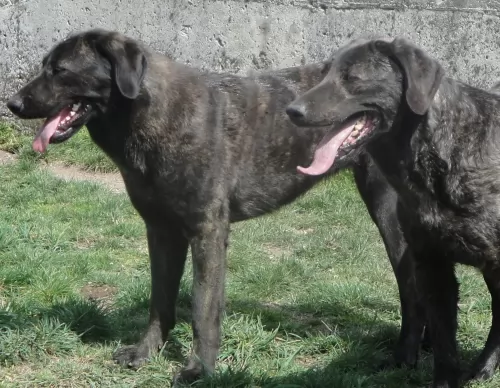 The Cao de Castro Laboreiro has a short coat which requires minimal grooming. Brushing him twice a week to rid him of loose hairs will suffice.
The Cao de Castro Laboreiro has a short coat which requires minimal grooming. Brushing him twice a week to rid him of loose hairs will suffice.
Nail clipping as well as ear- and teeth cleaning are other routine maintenance procedures for your pet.
The food you give your pet must be well-balanced and have protein and carbohydrates. If you want his skin and hair to remain healthy, vitamins, fatty acids and minerals will also be needed.
Boneless chicken and fish, brown rice and vegetables can be a good choice as well as some of the top quality commercially manufactured foods. An active dog will always need a higher protein content and therefore including raw meat into the diet is imperative – not every day as it can be very expensive, but every other day.
Remember that bones can be dangerous as they can splinter and cause your pet internal damage. Fresh, cool water must be available at all times.